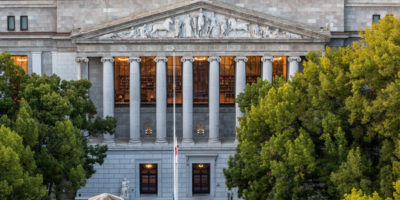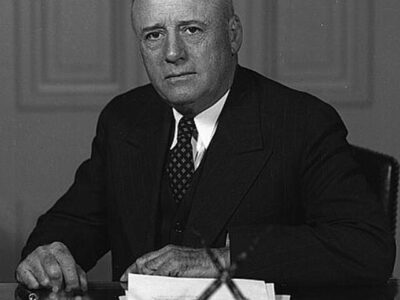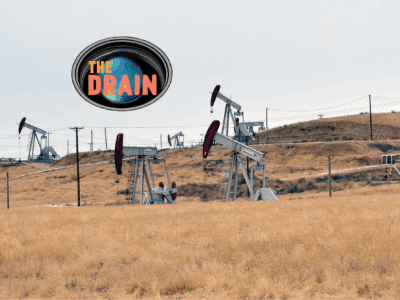California Appellate Court Hears Arguments in Cap-and-Trade Program Challenge
Court of Appeal Justices Appear Inclined to Reject Industry’s Constitutional Attack on State’s Cap-and-Trade Auction System
On Tuesday, the California Court of Appeal in Sacramento heard oral arguments in the most formidable legal challenge to the State of California’s ambitious, multifaceted efforts to reduce greenhouse gas emissions.
That challenge takes the form of two cases, consolidated on appeal: California Chamber of Commerce v. California Air Resources Board and Morning Star Packing v. California Air Resources Board. Both lawsuits attack the legality of California’s cap-and-trade program, a market-based system by which GHG emission allowances are purchased and traded among generators of GHG emissions. The cap-and-trade program is a key component of the California Air Resources Board’s multifaceted efforts under AB 32 to reduce the state’s aggregate GHG emissions to 1990 levels by 2020.

The gist of the industry challenge to CARB’s cap-and-trade program is that the Board’s collection of revenues from GHG emitters via CARB’s auction of emission allowances constitutes an illegal tax in violation of Proposition 13, embedded in the California Constitution. Specifically, the regulated industry contends that since the 2006 legislation enacting AB 32–which specifically authorizes CARB to create and administer the cap-and-trade program–was only passed by simple majorities of the state Assembly and Senate, the auction proceeds constitute an alleged, illegal “tax.” That’s because under Proposition 13, state taxes must instead be enacted by a two-thirds “supermajority” of both houses of the California Legislature. (Legal Planet colleague Cara Horowitz, who filed a friend-of-the-court brief in these cases with the Court of Appeal in support of CARB, has previously blogged on the litigation on this site.)
The Sacramento Superior Court rejected the industry challenge, ruling that the auction revenues raised through the CARB cap-and-trade system’s auction process doesn’t constitute a tax, and that Proposition 13’s supermajority voting requirements are therefore inapplicable. The industry plaintiffs then appealed the adverse trial court ruling to the Court of Appeal. After the parties had filed their written arguments, that court submitted a series of supplemental questions to the parties which, to some observers, intimated that the challengers’ arguments resonated at least to some degree with the Court of Appeal justices.
So Tuesday’s oral arguments before the appellate court in Sacramento predictably drew a courtroom packed with attorneys, policymakers and reporters. Those arguments didn’t disappoint: all four of the arguing attorneys performed admirably, and the three-justice panel was well-prepared with tough and incisive questions for both sides. Nielsen Merksamer attorney Jim Parrinello, representing the Chamber of Commerce, and the Pacific Legal Foundation’s Tony Francois, representing Morning Star Packing, stressed in their arguments that they were not contending that CARB lacked authority to administer a cap-and-trade program as part of its regulatory strategy to reduce GHG emissions in California. Rather, they argued, it was requiring businesses to purchase a portion of those emission allowances via CARB-administered auction process that violated Proposition 13. The millions of dollars in revenue raised in those auctions constituted taxes, they maintained, and CARB had failed in its burden of demonstrating otherwise. They allowed that the constitutional problems with CARB’s cap-and-trade program would disappear if only the state were to simply distribute the emission allowances to the regulated community for free.
Deputy Attorney General David Zonana, representing CARB, argued that the auction proceeds were not taxes but, rather, “regulatory instruments,” the monetary proceeds from which are devoted to a number of programs directly related to achieving California’s overarching policy goal of reducing state GHG emissions. Besides, he noted, no California businesses are compelled to buy emission allowances at auction; purchasing allowances is only one of “a menu of compliance options” available to the regulated community to help reduce their GHG emissions. Finally, Shute Mihaly & Weinberger attorney Matt Zinn, representing the Natural Resources Defense Council and Environmental Defense Fund, argued in support of CARB that California’s GHG reduction efforts have “never been more important”–a not-so-subtle reference to the Trump Administration’s antipathy toward government climate change mitigation programs. Zinn attacked industry’s plea for free emission allowances, arguing that those allowances are valuable assets that, if given away by CARB, would allow affected companies to offload the societal costs of their GHG pollution and make windfall profits at the same time, at the expense of California residents and consumers.
At the conclusion of oral arguments, the justices took the case under submission. They will issue their decision by late April.
It’s always risky to predict the substantive outcome of a case based simply on the oral arguments. Nevertheless, it seems to this observer that the justices appear inclined to rule in CARB’s favor, upholding the cap-and-trade program’s auction component and rejecting the business community’s constitutional challenge. I’m far more confident in predicting that whichever side loses in the Court of Appeal will seek review in the California Supreme Court. And, given the novel legal issues and the enormous policy implications of this litigation, there’s a strong possibility that the Supreme Court will in fact agree to hear these cases.
Meanwhile, the Sacramento Bee reports that the business community and state legislators are warming to California Governor Jerry Brown’s proposal for the Legislature to enact a new law–hopefully by a two-thirds supermajority–explicitly authorizing CARB to continue operating its cap-and-trade program beyond 2020. That would allow cap-and-trade to be a key part of CARB’s strategy to achieve the even more ambitious GHG reduction goals that the Legislature and Governor approved in 2016, committing the state to “double down” on its climate goals by reducing California’s GHG emissions 40%, compared to 1990 levels, by the year 2030. Depending on how that new legislation is drafted, it could also bolster CARB’s legal position in the pending Chamber of Commerce/Morning Star Packing litigation.
Reader Comments
2 Replies to “California Appellate Court Hears Arguments in Cap-and-Trade Program Challenge”
Comments are closed.







There is no empirical data and no conclusive scientific proof that cap and trade has any effect at all on global climate, it is malicious fraud. Cap and trade does not mitigate climate, instead it steals public money for the benefit government employees, contractors, academics and other crooks that lack moral turpitude and depend on government funding. California embraces public corruption and therefore deserves scorn and poverty.
I agree hat California cap and trade is a tax, but do not agree the issue is simply a question of whether allowances are auctioned or freely allocated to regulated entities. There are two issues.
The first is CARB’s creation of an over-supply of allowances that are freely allocated to electricity and natural gas distributors–which are entities to whom suppliers might pass through cap and trade costs, but who are not, for the mostpart, directly regulated entities.
Every distribution utility gets free allowances in excess of CARB’s estimate of the maximum required to cover their indirect supply chain cap and trade costs. The distributors are hen required, by law, to consign their allowances to the state auction. The state sells he allowances, then owes the resulting revenues to he distribution utilities. There are restrictions on how the utilities can use the revenues.
By creating the excessive allowance supply out of the air, then freely allocating it to distributors–not regulated entities–CARB is simply creating a new revenue stream for power and gas distributors which is paid for by regulated emitters who are outside their supply chain. Because the free allowances exceed the distributors’ exposure to cap and trade, it’s simply a new tax on outside-the-power and-gas-supply chain emitters to create a new revenue stream for utilities. There is no net GHG reduction. This is an arbitrary new tax on select–not all–regulated entities designed to subsidize CO2-INTENSIVE power and gas sales to u regulated entities.